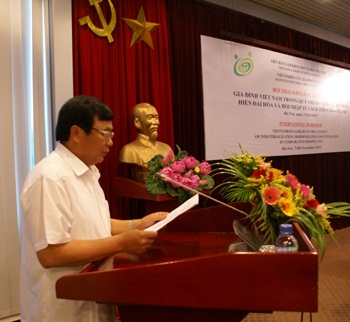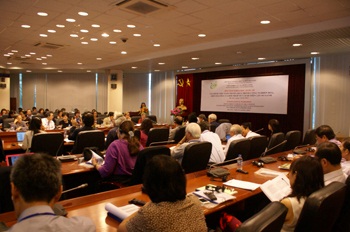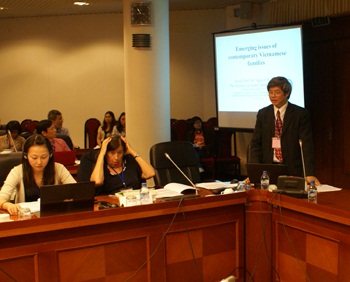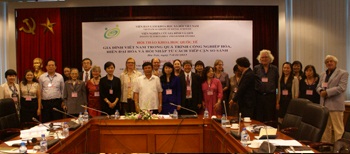In response to the year 2013 of the Vietnamese families, Insitute for Family and Gender Studies received the approval of the leadership of Vietnam Academy of Social Sciences (VASS) to hold the international conference on “Vietnamese families in the process of industrialization, modernization and integration from the comparative approach” on 7-8 November 2013 in Hanoi.
|

|
Prof.Dr. Nguyen Xuan Thang, Member of the Central Communist Party Committee, President of VASS, opening the conference |
|
The conference received the attendance of Prof.Dr. Nguyen Xuan Thang, Member of the Central Communist Party Committee, President of VASS; delegates from member departments and units of VASS, universities in Hanoi; the delegates from the Central Propaganda Department, National Assembly Committee for Social Affairs, Ministry of Culture, Sports and Tourism, Ministry of Labour, Invalids and Social Affairs, and Vietnam Women’s Union as well as the international delegates from Japan, USA, UK, Netherlands, South Korea and Taiwan.
In his opening remarks, Prof.Dr. Nguyen Xuan Thang emphasized the vital role of the family as the social basic institution and not only in the development and happiness of individuals, but also in implementing social functions and the national cultural value preservation and transfer from generation to generation. It is the stability and healthy development of the family that contributes to the stability and sustainability of the community and the society.
Understanding the importance of the family in the industrialization and modernization of the country, since 1994, the International Year of the Family, family-related research in Vietnam has been pushed up. Together with other research institutions, the Institute for Family and Gender Studies, the very first national research institution and one of the leading research organizations on this issue in Vietnam today, has conducted various studies of different scopes and scales.
The outcomes of these studies have contributed to the detection and interpretation of the emerging family-related issues, as well as identified the characteristics and the tendency of changes of the family during the Doi Moi in Vietnam. They can be named as the downsizing trend of the family; the increase in the age of marriage; the change of marriage selection model; the growing demand for the elderly care; the changes in the way of child protection, taking care and education in a family; the presence of new family forms; the changes in the patterns of labour division and power relations in Vietnamese families in different regions; the diversity of domestic violence acts; and the key role of the State and the civil societies and the family for the prevention and protection against family violence acts, etc. These research results have helped to form the scientific foundation for the eatablishment of laws, decrees, and social policies for promoting the vital role that the family plays to ensure the happiness and development of the family members as well as the social stability and progress.
 |
Being highly aware of the importance and the role of the family in the industrialization and modernization of the country, the Vietnam Commnunist Party and the State have issued different legal documents, policies and particular action programs to build up the prosperity, progress and happiness of Vietnamese families. The deployment and enforcement of the family-related policies, however, remain limited and inadequate and encounter difficulties. Vietnam has just entered the first stage of the industrialization and modernization while many other countries in the world and the region have shifted to the post-modernization. The family institutions in each country and each stage of development are also constantly changing. Nevertheless, despite taking place in different contexts, the transformation of the family in the process of industrialization and modernization still have a lot in common and universal characteristics.
A number of research questions should be raised as follows: (1) Will the current situation of the families in developing countries be the future of Vietnamese families from the perspective of family modernization theory? (2) What are the characteristics of the transformation of the traditional family to the modern one in Vietnam compared to other countries? (3) Will the process of industrialization and modernization and international integration remove the characterized values of Vietnamese families? (4) What are the efficient solutions to building the prosperity, progress and happiness of Vietnamese families during the process of industrialization, modernization and international integration? Those are key problems for the family study in Vietnam today. The discussion and sharing experience in family studies with advanced countries are, therefore, particularly required.
|

|
Assoc.Prof.Dr. Nguyen Huu Minh, Director of Institute for Family and Gender Studies, delivered his presentation at the Conference |
|
The workshop drew the attention and active participation of international scholars from developed and developing countries and teritories in Asia, Europe and the Americas. This was an opportunity for the Vietnamese scholars not only to identify and analyze the family characteristics and trends in Vietnam during the promotion stage of industrialization, modernization and international integration of the country, but also to expand research cooperation in the field of family study with international scholars.
The Conference had four sessions of thematic discussion besides the plenary discussion. The plenary discussion was co-chaired by Prof.Dr. Trinh Duy Luan from Institute of Sociology (VASS) and Prof. Emilko Ochiai from Kyoto University (Japan) with three presentations, named as “Vietnamese families and some emerging issues” (by Assoc. Prof.Dr. Nguyen Huu Minh, Institute for Family and Gender Studies), “Changes in the Western families: Towards gender equality?” (Prof. Roland Pfefferkorn, University of Strasbourg, France), and “The discrimination of family educational function in the transformation of social structure in Vietnam today” (Prof.Dr. Le Ngoc Hung, Institute of Sociology, Hochiminh National Academy of Politics and Public Administration).
The first session of thematic discussion, Family structure and functions, was chaired by Assoc.Prof.Dr. Nguyen Thi Kim Hoa, University of Social Sciences and Humanities (Hanoi National University) and Assoc.Prof.Dr. Le Ngoc Van, Institute for Family and Gender Studies (VASS). There were four papers presented including “Funtional changes in suburban families in the context of urbanization in the South” (Assoc.Prof.Dr. Tran Thi Kim Xuyen, Binh Duong University), “Constraints to maintaining race: HIV, reproductive risks, re-reprodutive stratification and population quality in Hanoi” (Assoc.Prof.Dr. Harriet Phirnay and colleagues, University of Seattle, USA), “Parent-teen in Vietnam today: the level of cohesion and questions raised” (MA. Dang Bich Thuy, Institute for Family and Gender Studies), and “Some issues about the current situation of family moral education – the case of Hanoi” (MA. Le Ngoc Lan, Institute for family and Gender).
|

|
Group photo of the participants |
|
The second session of thematic discussion, Family values, was co-chaired by Assoc.Prof. Loes Schenk-Sandbergen, University of Amsterdam, The Netherlands and Assoc.Prof.Dr. Vu Manh Loi, Institute of Sociology, VASS. The session comprised four presentations: ‘Sex selection in Vietnam and South Korea: a comparative study” (Assoc.Prof. Ki-Soo Eun, Seoul National University, South Korea), “Happiness and family happiness through some domestic and overseas research” (MA. Nguyen Thi Thanh Tam, Institute for Family and Gender Studies), “Comparison of attitudes toward non-traditional families in East Asia: wife-husband age difference, unmarried cohabitation and marriage without children” (Prof. Chu Chin Yi, College of Social Sciences, Taiwan and Han Yu Jao, Northwestern University, Taiwan), and “Early marriage – a social problem in Vietnam” (Assoc.Prof.Dr. Hoang Ba Thinh, University of Social Sciences and Humanities).
Chairpersons for the third session of thematic discussion, Family diversity, were Assoc. Prof. Ki-Soo Eun, Seoul National University, South Korea and Dr. Khuat Thu Hong, Institute for Social Development Studies. There were five presentations delivered: “Changes in the family structure in the Northern Delta and poverty” (Assoc.Prof.Dr. Vu Tuan Huy, Institute for Regional Sustainable Development), “The intergenerational exchange of care and support: A comparison between Malaysian and Vietnamese families” (Dr. Jopei Tan, Royal Holloway, University of London, United Kingdom), “Gender relations in suburban families in Ho Chi Minh City” (Dr. Nguyen Thi Hong Xoan and MA. Tran Thi Anh Thu, University of Social Sciences and Humanities in Ho Chi Minh City), “Expanding high level of education for women and its mpact on the family life values in Asian societies: a comparative study based on the survey data in East Asia in 2006 and family surveys in Thailand and Vietnam in 2010” ( Prof. Hachiro Iwai, Kyoto University, Japan), and “Some characteristics of ethnic minority families in Vietnam in the context of integration and development” (Dr. Dang Thi Hoa, Institute for family and Gender Studies).
The fourth sessions of thematic discussion titled Policy and action for family development was co-chaired by Mme. Tran Anh Tuyet, Ministry of Culture, Sports and Tourism and Prof. Roland Pfefferkorn, University of Strasbourg, France. The session had five presentations: “The family and the welfare state: Changing trends and challenges in care for the elderly and children in the Netherlands” (Prof. Loes Schenk-Sandbergen, University of Amsterdam, the Netherlands). “Building Vietnamese families of prosperity, progress, and happiness in the process of industrialization, modernization and national integration” (Prof. Le Thi, Institute for Family and Gender Studies), “Imprints of socialism in family and gender policies” (Prof. Ochiai Emilko, University of Kyoto, Japan and Dr. Tran Thi Minh Thi, Institute of Sociology, VASS), “Family in a number of UN documents on human rights” (Vu Ngoc Binh, Institute of Population, Family and Children), and “Family welfare in Southern rural areas today” (MA. Vu Thi Thu Thanh, Southern Institute for Social Sciences).
The conference provided a more completed assessment of the achievements and challenges of the building and development of Vietnamese families since the Doi Moi. The family characteristics and changing trends in Vietnam were seen and analyzed from different perspectives of structure, functions, relationships and family values.
The research ideas of family studies in the context of industrialization, modernization and integration in Vietnam from comparative approach were also proposed. This would help to identify better the new development trends of the Vietnamese families as well as to perfect the family policies. The conference outcomes would be the key inputs for VASS to build research programs as requested by the Government on the justifications for building Vietnamese families in the period of industrialization, modernization and international integration of the country delivered.
Nguyen Thu Ha







